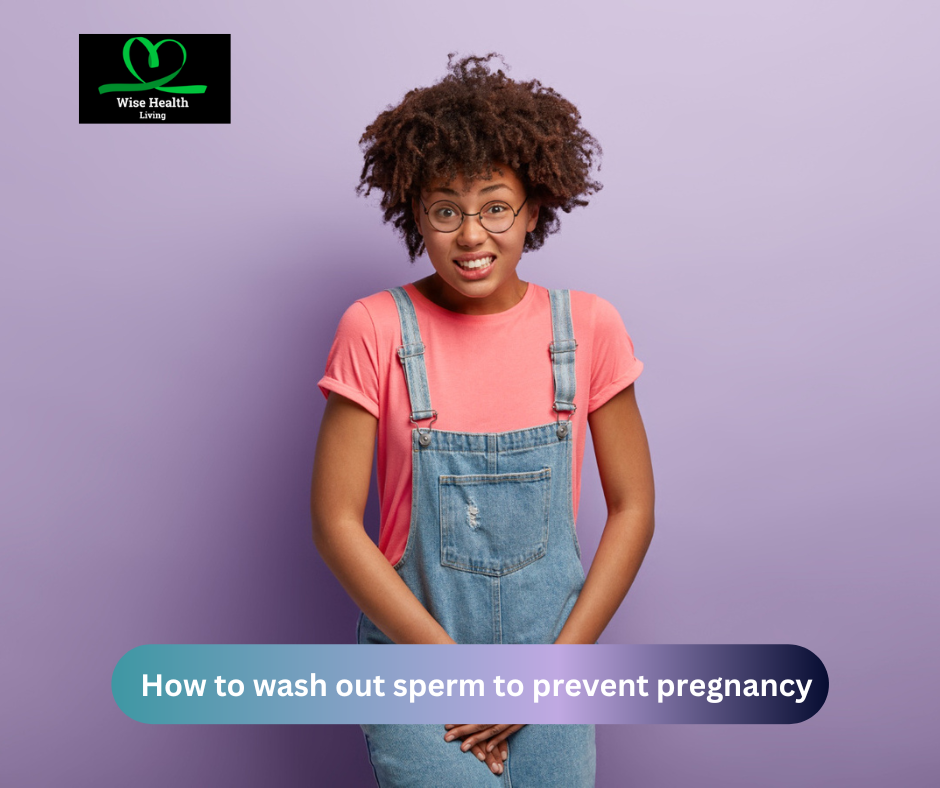Wondering How to wash out sperm to prevent pregnancy? Or if it is even possible at all. There are several misconceptions admist the truth itself according to science and in this article, we will be exploring everything you need to know.
Let’s dive right in!
What is a Sperm?
The sperm is a specialized cell that plays a crucial role in human reproduction. It is the male reproductive cell that is responsible for fertilizing the female reproductive cell, the egg, resulting in the creation of a new human life. In this article, we will explore the structure of sperm, its importance in human reproduction, its lifespan, and the process it goes through during human reproduction.
The structure of sperm
Sperm is a highly specialized cell with a unique structure that allows it to perform its function effectively. A sperm cell consists of three main parts: the head, midpiece, and tail.
- The head contains the genetic material, including the DNA that will be passed on to the offspring.
- The midpiece contains the mitochondria, which provide the energy required for the sperm to swim towards the egg.
- The tail, also known as the flagellum, is responsible for propelling the sperm towards the egg.
The structure of sperm is highly adapted to its function, allowing it to travel through the female reproductive tract and reach the egg.
Importance of the sperm in human reproduction
Sperm is essential for human reproduction as it is the male reproductive cell responsible for fertilizing the female reproductive cell, the egg. During sexual intercourse, sperm is released from the male reproductive organ, the penis, and enters the female reproductive tract. Sperm must swim through the cervix, uterus, and fallopian tubes to reach the egg. Once the sperm reaches the egg, it must penetrate the protective layer surrounding the egg, known as the zona pellucida, to fertilize the egg. The fertilized egg will then travel down the fallopian tube and implant in the lining of the uterus, resulting in pregnancy. Without sperm, human reproduction would not be possible.
The lifespan of the Sperm
Sperm has a relatively short lifespan outside of the male body. Sperm can survive for up to five days inside the female reproductive tract, but once it is outside of the body, its lifespan is significantly reduced. Factors such as temperature, humidity, and exposure to air can affect the lifespan of sperm. Sperm that is exposed to high temperatures, such as in hot tubs or saunas, may have reduced viability and may not be able to fertilize an egg.
Sperm in the Process of Human Reproduction
Human reproduction involves a complex series of events that involve the release of hormones, the production of eggs and sperm, and the fertilization of the egg by the sperm. In females, the process of reproduction involves the release of an egg from the ovaries during ovulation. The egg travels down the fallopian tube towards the uterus, where it can be fertilized by sperm. In males, the process of reproduction involves the production of sperm in the testes. The sperm is then stored in the epididymis until it is released during ejaculation. During sexual intercourse, sperm is released from the penis into the female reproductive tract, where it can fertilize the egg.
In essence, we can understand that the sperm is a highly specialized cell that is essential for human reproduction. Sperm has a unique structure that allows it to swim towards the egg and fertilize it. The lifespan of sperm is relatively short outside of the body, and it must reach the egg within a few days of ejaculation to be able to fertilize it. The process of human reproduction involves the release of hormones, the production of eggs and sperm, and the fertilization of the egg by the sperm. Understanding the structure and function of sperm is crucial in understanding the process of human reproduction.
Now that we know all about sperm, let us now find out how to wash out sperm to prevent pregnancy.
Recommended – Can Drinking Hot Water Shrink Fibroids?
How to wash out sperm to prevent pregnancy
It is crucial to remember that there is no foolproof method of washing away sperm to avoid conception. Utilising a trustworthy method of birth control, such as an intrauterine device (IUD), hormonal birth control, or condoms, is the most efficient approach to avoiding pregnancy. However, there are things you can do to lower the risk if you’re worried about the likelihood of getting pregnant after unprotected intercourse.
First of all, it’s crucial to comprehend that sperm might last for up to five days within the female reproductive canal. This implies that there is still a chance of pregnancy even if you wash out the sperm right away after unprotected intercourse if ovulation takes place during that time.
That being said, here are some steps you can take to try to wash out sperm:
1. Urinate
After intercourse, urinating might assist in flushing sperm from the urethra. Semen-containing sperm is expelled from the penis into the vagina during ejaculation. The tube that removes urine and semen from the body through the penis may still contain some semen. Urinating after sex can assist to wash away any lingering sperm or semen in the urethra, which decreases the likelihood of fertilisation.
It is crucial to remember that peeing after intercourse is not a dependable technique of contraception and shouldn’t be used as the only way to avoid getting pregnant. Use an effective method of birth control effectively and regularly if you have sexual activity but don’t want to get pregnant.
2. Vaginal douching
Rinsing the inside of the vagina with a liquid solution is known as vaginal douching. It is thought that douching with an acidic solution or one that contains ingredients like vinegar or baking soda can assist to lessen the hospitability of the vaginal environment to sperm and may even help to wash away any sperm that may still be present in the vagina.
Vaginal douching is not advised as a routine practice, though, since it might disturb the normal balance of bacteria in the vagina and raise the risk of infections. Douching can also raise the risk of pelvic inflammatory disease (PID), a dangerous infection of the female reproductive organs, by pushing bacteria and other hazardous chemicals further into the reproductive tract.
Douching is not a reliable technique of contraception and should not be used as the only way to avoid pregnancy, even if it may help to remove some sperm from the vagina.
3. Use spermicide
A form of contraception known as a “spermicide” contains a chemical agent that is intended to immobilise or destroy sperm, preventing them from reaching and fertilising an egg. Spermicides can be used alone or in conjunction with other means of contraception, such as condoms or diaphragms, and come in a variety of forms, including gels, foams, creams, and films.
Spermicides function when applied properly by forming a barrier that stops sperm from passing past the cervix and entering the uterus. A substance called nonoxynol-9, which is poisonous to sperm and can kill them on contact, is often the active component in spermicides. Other chemicals with comparable properties, including octoxynol-9 or benzalkonium chloride, may also be included in certain spermicides.
Usually with the use of an applicator, spermicides are applied to the vagina before sexual activity. To give the substance enough time to dissolve and distribute throughout the vagina, spermicides should be used at least 10-15 minutes before sexual activity. Combining spermicides with a barrier form of contraception, such as a condom or diaphragm, can boost the efficiency of spermicides.
While spermicides can aid in immobilising or killing sperm, it is crucial to remember that they are not always successful in preventing conception. Spermicides should be used in conjunction with other forms of contraception since they can have a failure rate of up to 28% when used alone.
Additionally, some persons who use spermicides could encounter negative side effects such as itchiness or allergic responses. After taking a spermicide, you should stop using it and consult your doctor if you feel any pain or strange symptoms.
4. Take a shower or bath
After having intercourse, taking a bath has no discernible impact on the removal of sperm from the body. During ejaculation, sperm are discharged into the vagina and can pass past the cervix and into the uterus in a matter of minutes. They may also wait for an egg to be released for fertilisation for a number of days in the vagina or cervix.
After-sex bathing or washing may assist to get rid of any remaining semen and lessen odours or pain, but it has no effect on the likelihood of getting pregnant. The warm, wet atmosphere of a bath can encourage the growth of bacteria, thus bathing just after intercourse may actually raise the risk of illnesses.
While taking a bath may have additional health advantages for personal cleanliness, pregnancy should not be prevented with this strategy.
It is important to note that these methods are not foolproof and should not be relied upon as a sole method of contraception. If you are sexually active and do not wish to become pregnant, it is important to use a reliable form of birth control consistently and correctly. Additionally, if you have concerns about the possibility of pregnancy after unprotected sex, you should speak with a healthcare provider about emergency contraception options, such as the morning-after pill.
Recommended – Can I Use Astymin Syrup For Weight Gain? [Answered]
What are emergency contraceptives?
After unprotected intercourse or a contraceptive technique that failed to prevent pregnancy, emergency contraceptives are methods of contraception that can be utilised. Emergency contraceptives function by stopping ovulation, fertilisation, or implantation—all processes that lead to the release of an egg from the ovary or the attachment of a fertilised egg to the uterus.
Emergency contraceptives come in two primary categories:
a. Hormonal emergency contraceptives
Emergency contraceptives that contain hormones to restrict ovulation or stop fertilisation are known as hormonal emergency contraceptives. The “morning-after pill,” which is hormonal emergency contraception accessible over-the-counter at most pharmacies, is the most popular form. The morning-after pill, which should be taken within 72 hours (3 days) following unprotected intercourse, includes a high dosage of the hormone progestin or a combination of progestin and oestrogen. Another more recent hormonal emergency contraception tablet can be used for up to 5 days following unprotected intercourse.
b. Copper Intrauterine devices (IUDs):
Copper IUDs are a long-acting, reversible method of birth control that may also be used in an emergency. Within five days of unprotected intercourse, a healthcare professional can place a copper IUD to stop fertilisation or implantation. A copper IUD can function as continuous contraception for up to 10 years after it has been implanted.
Although both kinds of emergency contraceptives are quite efficient in preventing pregnancy, they shouldn’t be used as a primary way of birth control. To avoid unexpected pregnancy, it’s critical to regularly and correctly utilise a dependable method of contraception.
Speak with a healthcare professional about emergency contraceptive choices if you’re worried about the chance of getting pregnant after unprotected sex. It’s critical to act quickly since emergency contraception works best when used as soon as possible following unprotected intercourse.
Read Also – Can I Use Sprite And Salt To Avoid Pregnancy?
In conclusion
Sex is a natural and healthy part of life, and it can bring many physical, emotional, and social benefits. Sexual intimacy can enhance emotional connection and intimacy between partners, reduce stress and anxiety, promote better sleep, and even boost the immune system. Sexual activity can also release endorphins, which are natural mood-boosting chemicals in the brain that can help to reduce pain and enhance feelings of pleasure.
People have sex for many reasons, including to express love and affection, to feel pleasure, to connect with a partner, and for procreation. For many people, sex can be a fulfilling and enjoyable part of their lives, and it can help to strengthen relationships and enhance overall well-being.
However, there are also potential downsides to sex, particularly when it is unprotected or unplanned. Unintended pregnancy is one of the most significant risks of unprotected sex, and it can have far-reaching consequences for individuals and families. An unintended pregnancy can be emotionally and financially challenging, and it can impact a person’s education, career, and future opportunities. It can also put a strain on relationships and lead to difficult decisions about parenting and family planning.
From what we have seen, we can deduce that how to wash out sperm to prevent pregnancy comes with a few ideas; but many of these ideas are not viable and can not guarantee not getting pregnant. The ones that can guarantee not getting pregnant have been enumerated above.



